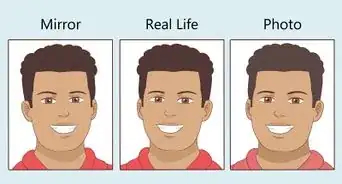This article was co-authored by Rachel Eddins, M.Ed., LPC-S. Rachel Eddins is a Licensed Professional Counselor and the Executive Director of Eddins Counseling Group. With more than 20 years of experience, she specializes in working with clients with eating disorders, anxiety and depression, relationship issues, and career obstacles. Rachel earned a BA in Psychology from The University of Texas at Austin and an MEd in Counseling from The University of Houston. She received a Group Psychotherapist Certification from the American Group Psychotherapy Association and an Intuitive Eating Counselor Certification through Intuitive Eating Pros. She is also recognized as a Master Career Counselor through the National Career Development Association.
There are 13 references cited in this article, which can be found at the bottom of the page.
This article has been viewed 28,556 times.
Hearing comments like “You should lose weight” or even “Geez, you're getting too thin” can be upsetting and cause shame. If you find yourself struggling to respond to unwelcome comments, there are some practical suggestions you can follow. Use your voice to stand up to body-shamers and take steps to preserve (or boost) your self-confidence when they strike.
Steps
Choosing How to Respond
-
1Identify the source. Think about the nature of your relationship with the other person before choosing an appropriate response.[1] In some cases, it may not even be worth your time to say anything back.[2]
- Is it a random stranger on the street? If the person doesn't know you personally, don't take the comment personal. Throw the stranger off by flashing a bright smile and keep walking.
- Is it nosy relative who's always making negative remarks? It may be time to correct them and let them know you will not accept insults. For example, if a relative asks you if you've gained weight, you could gracefully dodge the question by saying: "I'm feeling great. How about you?"
- Is it a parent who suffered from obesity as a child and is simply worried about you having to go through what they did? In this case, it can help to have sympathy for their situation and not take offense.[3]
-
2Ignore the comment.[4] Not giving a reaction is perhaps the most powerful way you can stop a body-shamer in his or her tracks. Much of the time, this person is probably conveying a deeply held insecurity or misconception they have about health from childhood.[5]
- If a body-shamer isn't related to you and doesn't know you personally, then their comments are probably directed at getting a reaction out of you to make themselves feel better. Don't give them the satisfaction of reaction. Continue on your way as if the person didn't say a thing to you.
Advertisement -
3Reciprocate awkward “compliments.” Sometimes, criticism comes in the form of a seemingly innocent compliment. Consider that someone says “At least you have a pretty face…” You can throw the speaker off with your own witty remark by returning with “Thanks, so do you.” The person will be surprised at your response and likely won't continue on that same topic for very long.
-
4Brush off the comment with a funny retort. Humor is always a great way deflect criticism and ease the awkwardness of someone's ugly remark. While defensiveness can make others embarrassed for you, a well-timed joke can make them want to give you a high-five.
- Let's say someone mentions how skinny you are by saying “Are you sure your parents have been feeding you?” You can respond with some quick-witted humor, like “Yikes! I had no idea I'd be questioned by the food police today!”
-
5Be selective about who and how you self-disclose. In some cases, a person's remark could strike a nerve because they don't truly understand the circumstances of your weight gain or loss. If a relative or other acquaintance makes an ignorant comment about your weight, educate them.
- You can easily put unwelcome comments to rest by using self-disclosure. It's likely this person is speaking without knowledge. Clarifying the situation can minimize future remarks. However, you should only share what you feel comfortable telling.
- In response to “The last time I saw you, you were such a little thing. You've gotten so big!” You could use self-disclosure to educate this person by bluntly saying “I have a hormonal disorder that makes it difficult for me to lose weight. If you'd like, I can tell you more about what this has been like?...”
Maintaining Self-Confidence
-
1Become your own #1 fan. People are often their own worst critics.[6] Recognize that you are more than your body. Focus on all the things you love about yourself and give yourself a huge round of applause for being you.
- One way to silence your inner critic—and not find yourself making horrible remarks to yourself about your weight—is to overload on self-flattery. Grab a pen and notepad and make a long, exhaustive list of all your greatest attributes. Write “I am…” in front of each trait to harness your unlimited inner power.[7]
- If you run out of traits to add, enlist your close friends and family members to give you more ideas. These are the people who love and support you, so they will have many positive ways to describe you.
- Go back over your list, reading it aloud on a daily basis. Notice the untapped power and confidence you feel when you start acknowledging all the things you have going for yourself.
-
2Practice self-compassion. Loving yourself by showing self-compassion is also an effective way to improve your self-confidence and feel better about yourself. Some things you can do to practice self-compassion include:
- Writing a compassionate letter to yourself. In the letter, imagine that you are writing from the perspective of a friend who loves you unconditionally. What might this person say to encourage you and make you feel better about the things people have said about your weight? Write yourself a letter from this perspective and read it often.
- Watching for self-critical talk. As a result of people saying negative things to you, you might internalize these messages and start to speak to yourself in a critical way. Watch out for these self-critical thoughts and try to challenge them as they occur. For example, if you catch yourself thinking, “You are disgusting!” then use compassion to change this thought by saying, “No, that is not true. I am a kind, caring, beautiful person.”[8]
- Keeping a compassion journal of your daily activities. Another good way to nurture self-compassion is to write in a journal. In the journal, record all of the stressful, challenging, or upsetting events of your day. Then, write compassionate messages to yourself about these events. Aim to be understanding and comforting towards yourself. For example, you might write, “I understand how upsetting that was for you. It was very mature of you to just walk away from that person when she started commenting on your weight.”[9]
-
3Be willing to accept compliments. When you are self-conscious about your body, even positive statements may be met with an awkward response from you. People with low self-esteem often feel uncomfortable when complimented because the comment contradicts their own self-views.[10]
- Don't minimize your positive traits by shaking off a compliment. Instead, accept compliments gracefully by simply replying with a humble “thank you” to show your gratitude.[11] Over time, this practice will become easier and easier to do. And, over time, you may just start to believe them, too.
-
4Highlight your best asset. Another way to build self-esteem is to focus on the physical features that you do like. It may take time for you to come to a place of acceptance about your body size or shape. However, there is probably some aspect about your appearance that you like right now. Focus more on these traits and less on the features that you are not so pleased with.[12]
- Perhaps you like your eye color. If so, choose colors in your clothing, hair, or makeup that complement and accentuate your eyes. Maybe you pride yourself on having healthy, clear skin. Each time you look in the mirror, focus on how gorgeous your skin looks.
- Try to “discover” new things that you like about your physical appearance. You may start to notice yourself warming to traits you once didn't like as you develop greater self-confidence and self-acceptance. For example, you may not have liked how muscular your legs were before, but now you realize how useful they are when playing soccer.
-
5Take care of yourself. One research-backed method to increase self-esteem is to treat your body well.[13] Due to genetics or certain medical conditions, a person can't choose their unique body shape or size. You do have a choice of how you treat yourself though.
- Take strides to fuel your body with healthy foods, get regular exercise, sleep 7 to 9 hours each night, dress comfortably for your body and engage in self-care on a daily basis.[14]
Getting Distance from Hurtful People
-
1Separate the good from the bad. Learn how to identify negative commenters and those who are just concerned. If you find yourself having to constantly ignore, defend, or apologize for your body due to certain people's comments, you must protect your well-being by removing these people from your life.
- Getting distance can be particularly hard if it's a close friend or family member, but it can be harmful to be around anyone who makes you feel bad about yourself.
- Keep in mind that you or your body don't require approval from anyone. If friends or family can't be supportive, gently tell them that “I can't be in an unsupportive environment right now” and get as much space as you can depending on your situation. If you can't get space, just remind yourself in their presence that you are not seeking approval. Or, ask a sibling or friend to come along to family gatherings who can serve as a source of support.
-
2Look for positive outlets for social support. As you start to realize who's supportive and who's not, make an effort to foster those relationships that serve you. If you have a friend or family member who is particularly supportive or who rushes to defend you from harsh comments, show your appreciation for this person. Count on them for support as you come to learn self-acceptance.
- Show appreciation by letting the person know how much you value him or her. Say something like "Sometimes, the family can get me down when they mention my weight. Thanks for standing up for me back there. You didn't have to, but I'm grateful that you did."
-
3Avoid sources of media that engage in body-shaming. Research shows that when overweight women see media stories about obese people being lazy, they are more likely to eat emotionally.[15] As you can see, paying attention to media depictions of body weight or body size can only worsen your situation.
- Challenge yourself to reduce exposure to media messages as much as possible. When you are exposed to TV shows or magazines that show human bodies in unrealistic proportions, view these images with skepticism.
Expert Q&A
-
QuestionHow do you deal with negative comments about weight?
 Rachel Eddins, M.Ed., LPC-SRachel Eddins is a Licensed Professional Counselor and the Executive Director of Eddins Counseling Group. With more than 20 years of experience, she specializes in working with clients with eating disorders, anxiety and depression, relationship issues, and career obstacles. Rachel earned a BA in Psychology from The University of Texas at Austin and an MEd in Counseling from The University of Houston. She received a Group Psychotherapist Certification from the American Group Psychotherapy Association and an Intuitive Eating Counselor Certification through Intuitive Eating Pros. She is also recognized as a Master Career Counselor through the National Career Development Association.
Rachel Eddins, M.Ed., LPC-SRachel Eddins is a Licensed Professional Counselor and the Executive Director of Eddins Counseling Group. With more than 20 years of experience, she specializes in working with clients with eating disorders, anxiety and depression, relationship issues, and career obstacles. Rachel earned a BA in Psychology from The University of Texas at Austin and an MEd in Counseling from The University of Houston. She received a Group Psychotherapist Certification from the American Group Psychotherapy Association and an Intuitive Eating Counselor Certification through Intuitive Eating Pros. She is also recognized as a Master Career Counselor through the National Career Development Association.
Licensed Professional Counselor You can choose to ignore them completely. However, make sure you do not internalize their comment by turning it into your own inner critic. Focus on your health instead, not weight. Remember, what you weigh is not more important than who you are!
You can choose to ignore them completely. However, make sure you do not internalize their comment by turning it into your own inner critic. Focus on your health instead, not weight. Remember, what you weigh is not more important than who you are!
References
- ↑ Rachel Eddins, M.Ed., LPC-S. Licensed Professional Counselor. Expert Interview. 23 March 2022.
- ↑ http://www.webmd.com/diet/obesity/features/say-what-coping-with-comments-about-your-weight#3
- ↑ http://well.blogs.nytimes.com/2013/01/09/feeling-bullied-by-parents-about-weight/?_r=0
- ↑ Rachel Eddins, M.Ed., LPC-S. Licensed Professional Counselor. Expert Interview. 23 March 2022.
- ↑ https://www.psychologytoday.com/blog/the-big-questions/201306/why-are-people-mean-part-1
- ↑ http://www.torontosun.com/2016/06/24/shaming-the-body-shamers
- ↑ http://leanin.org/education/know-your-strengths-own-your-strengths-no-one-else-will/
- ↑ http://self-compassion.org/exercise-5-changing-critical-self-talk/
- ↑ http://self-compassion.org/exercise-6-self-compassion-journal/
- ↑ https://www.psychologytoday.com/blog/the-squeaky-wheel/201308/why-some-people-hate-receiving-compliments
- ↑ http://www.huffingtonpost.com/jacqueline-whitmore/how-to-gracefully-accept-_b_7042718.html
- ↑ http://www.mtstcil.org/skills/image-3.html
- ↑ Rachel Eddins, M.Ed., LPC-S. Licensed Professional Counselor. Expert Interview. 23 March 2022.
- ↑ http://kidshealth.org/en/teens/self-esteem.html
- ↑ https://thinkprogress.org/study-fat-shaming-in-the-media-actually-ends-up-backfiring-5d08e40b6001#.fjbn3frgh





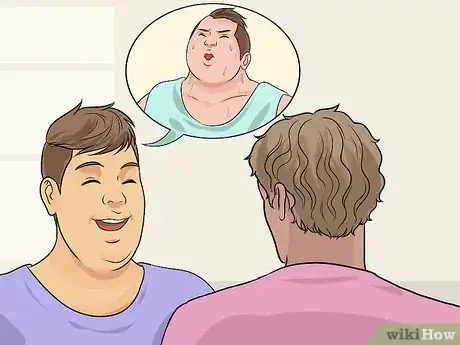

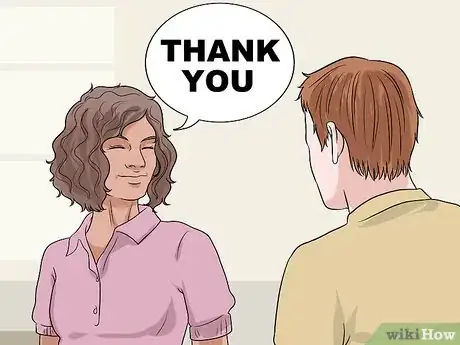
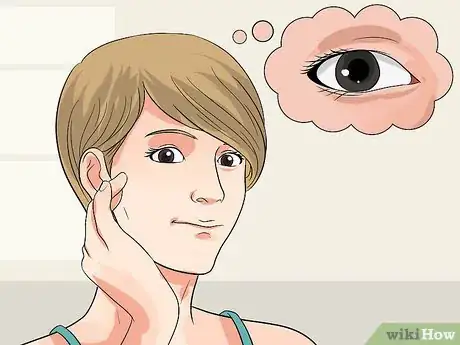



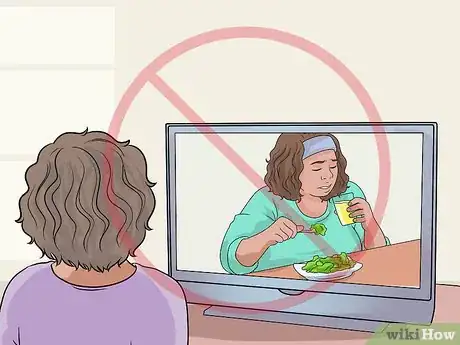




-Step-16-Version-2.webp)




